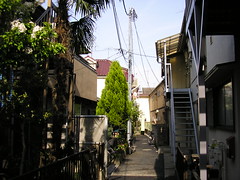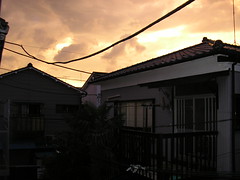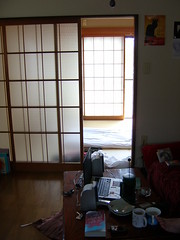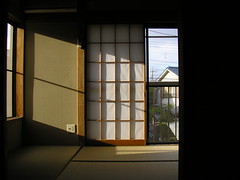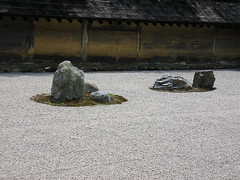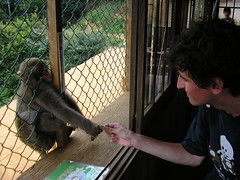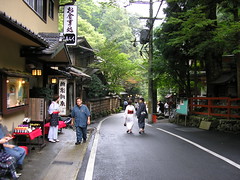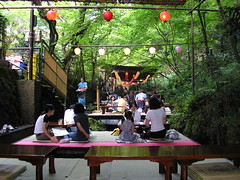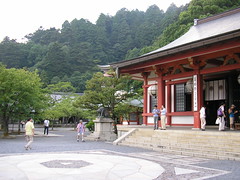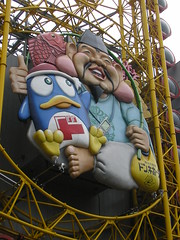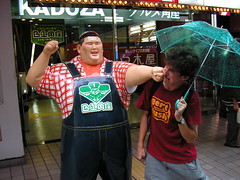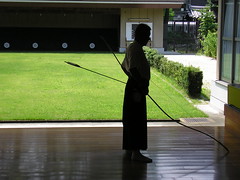Cultural misconceptions, the Japanese work ethic & other sweeping generalisations
I`ve touched on these issues in other entries...never resolved the first one; how gaijin may (or may not) be viewed by the Japanese in terms of the latters` fabled otherness. Part of the root, for teenagers at least, could be their English language textbooks, as these are probably their only reference to the English speaking world, apart from Hollywood or Fawlty Towers at a push. All the schools in Kawasaki use the same textbooks. In one of the first lessons, they learn that the English character, Ms. Jones (notable for her blonde hair and blue eyes), doesn`t like octopus. So, by the time they reach the second grade, most of the teenagers of Kawasaki have learned “I don`t like...” in the context of a westerner emphatically disliking octopus, complete with remorseful expression & “no-way-on-Gods`-earth-will-I-eat-that” hand gestures. That I find octopus even remotely palatable seems to shock many a Japanese person, none more so than the students.
Who can blame them for making this assumption? If it were solely up to Tricolore 3, I`d think that all French Bakers were terminally horny to the point of cellular collapse if their lusts went un-sated.
This phenomenon can work the other way. As well as giving peculiar impressions of the culture of the target language, your own society can be reflected in the same sense. Whilst looking for some activities on the Kawasaki City website, I discovered a “matching problems to solutions” card game, with such classics as “If you see a fire?” “Call 119”, “If you‘re hungry?” “Eat something“. The one that stands out for me is “If you’re tired?” “Drink some Ripobitan D”. Two questions instantly spring to mind;
a) What the hell is Ripobitan D? *
b) What`s wrong with a bit of kip?
I was presented with a delightful image of Englishness through a Japanese travel guide to London, the useful phrases section at the back having a victimised tourist chasing a mugger shouting “Robber!” That may come from a direct translation of the verb in question (Oi! isn’t taught at this level) - certainly when translated literally, Japanese verbs betray part of their national character - take “eat” - tabemasu. The conjugation goes “I won`t eat” - tabenai, “you WILL eat!” - tabe, “if I eat” - tabe ba and “let`s eat” - tabemashou. That a verb conjugation exists especially for the group is so Japanese you can smell it. The group is all important over here. Everybody does everything together - the word “tomodachi", although meaning "friend" has deeper connotations than the english word - a tomodachi is somebody you went to school with and did EVERYTHING with them, all the time. Solidarity within the group is paramount, but it can turn into one of those quirks that, to the alien, seems utterly bloody ridiculous. It's sometimes considered over here that the last person to leave work is the most hardworking & talented employee of the lot. I've walked home from a cathartic beer of a friday, past the school I live opposite to see the light in the Teachers room on after midnight. Murakami sensei, from that same school, didn't go home for THREE DAYS one week, staying in a capsule hotel in central Kawasaki...although I have heard stories of teachers staying behind playing Solitaire until eight at night, just so they wouldn't be the last to leave...
This brings me to the Japanese work ethic which, as I`m sure I`ve said before, is utterly bonkers. Whilst the lazy ALT was sunning himself during Golden Week, every teacher was at school from the crack of dawn, giving up this magnificent opportunity for some well-deserved rest, in order to run club activities. Kyomachi teachers are in school before me, and I live virtually across the road (although that`s probably a reason why). A lot of the students spend evenings and weekends in Jukus, or cram-schools, as entrance exams into the best High Schools and Universities are tough...but you’re pretty much set once you get there.
At five o`clock, in most work places you go to, there is a little chime that seems to say “Aaah, now it is five. Our days work is done. Come, let us go home, so that we might relax” (it also plays on tannoys in the street). This chime means nothing. Most teachers will still be in school a good two or three hours afterwards. There`s almost an unspoken expectation to put as much of yourself, to the detriment of everything else in your life, into your work. This spirit of self-sacrifice probably contributes greatly to the generally amiable Japanese demeanour, but you can take these things too far. A Samurai wouldn’t have thought twice about eviscerating himself and having a friend decapitate him if he felt he’d somehow messed up his job. Not that I’ve ever seen that at school. I have however, heard of a boy being hospitalised for three days by pushing himself too hard in a basketball tournament. Komada sensei, who runs the basketball club at Kyomachi (and fed me that alarming anecdote), is constantly knackered due to the massive workload he has. Our lessons are usually thrown together at the last minute. By contrast, Suzuki sensei is an unstoppable teaching machine - when team-teaching with her, Komada sensei and I are but marionettes to her omnipotent puppeteer. This has been re-confirmed for me by teachers at Nakanoshima Junior High, where she used to work (the Japanese education system having a policy of relocation if you‘ve been in one school for ten years). She`s a legend in her lifetime.
All that said, what`s the biggest problem I face when trying to teach English to teenagers? Motivation. Some things are true the world over. Here`s something else you can never escape from.
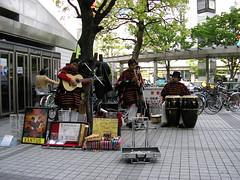
Never mind the Illuminatus...this is the real world-controlling conspiracy.
In other news, me ol` Uni-Mucka Dave has started his own blog, the uncompromisingly titled No Compassion Without Suffering. Not for the faint hearted.
* Ripobitan D is what you`d call a “Genki drink” (not an official title), “Genki” meaning “full of energy and vitality”. Genki drinks, to me, demonstrate the quintessentially Japanese attitude of “get up and go!...and keep going!”
Labels: culture (shock), I wasn't expecting that, Japan, school, teaching, that job they make me do

